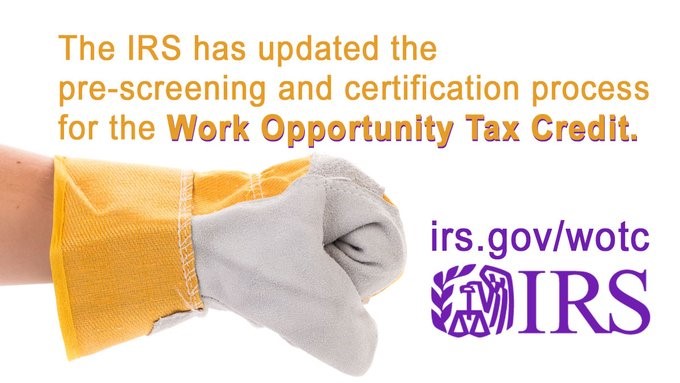
On September 19, 2022, the IRS published a news release regarding the Work Opportunity Tax Credit (WOTC), “IRS updates Information on tax credit helping businesses to hire certain categories of workers.” We previously noted that information on the IRS WOTC FAQ page was updated from:
- Pre-screening and Certification. An employer must obtain certification that an individual is a member of the targeted group, before the employer may claim the credit. An eligible employer must file Form 8850, Pre-Screening Notice and Certification Request for the Work Opportunity Credit, with their respective state workforce agency within 28 days after the eligible worker begins work. Employers should contact their individual state workforce agency with any specific processing questions for Forms 8850.
To the following IRS WOTC revised text:
- An employer must pre-screen and obtain certification from the appropriate Designated Local Agency (referred to as a State Workforce Agency or SWA) that an employee is a member of a targeted group to claim the credit. To satisfy the requirement to pre-screen a job applicant, on or before the day that a job offer is made, a pre-screening notice (Form 8850, Pre-Screening Notice and Certification Request for the Work Opportunity Credit) must be completed by the job applicant and the employer. The Targeted Jobs Tax Credit (TJTC), which preceded WOTC, did not contain a pre-screening requirement. In enacting WOTC to replace the TJTC in 1996, Congress included the requirement that employers pre-screen job applicants before or on the same day the job offer is made. In doing so, Congress emphasized that the WOTC is a subsidy designed to incentivize the hiring and employment of individuals who are members of targeted groups.
- On page two of Form 8850, there are four dates that must be provided before Form 8850 can be submitted to a SWA. They are the dates that the job applicant Gave information, Was offered job, Was hired, and Started the job.
- To confirm that the employer pre-screens the job applicant, and obtains information provided by the job applicant on the basis of which the employer believes that the job applicant is a member of a targeted group, the date the applicant Gave information about being a targeted group member must be a date that is the same as, or before the date the applicant Was offered job. The dates that the job applicant Was hired and Started the job must be on or after the dates the applicant Gave information and Was offered job. Form 8850 including the dates entered on page two of Form 8850, must be signed under penalties of perjury and must be submitted to the SWA (or postmarked, if mailed) no later than 28 days after the date that the job applicant Started the job.
A number of commentators have given the impression that this update reflects a new policy or a change of the WOTC program’s process with statements such as, “The IRS has updated the prescreening process for new hires.” In fact, the IRS is itself giving this impression by repeatedly tweeting a graphic that says, “The IRS has updated the pre-screening and certification process for the Work Opportunity Tax Credit.”

Has the IRS Changed Anything About WOTC?
No. The update has merely emphasized and more fully articulated rules that have been in the Internal Revenue Code since the inception of WOTC.
WOTC was created by Section 1201 of the Small Business Job Protection Act of 1996 (P.L. 104-188), and signed into law by President Clinton on August 20, 1996. While the law has been amended and extended numerous times since then, the very first version included the following requirement, which has remained unchanged through every subsequent iteration:
- Special rules for certifications. — (A) In general.–An individual shall not be treated as a member of a targeted group unless–
- (i) on or before the day on which such individual begins work for the employer, the employer has received a certification from a designated local agency that such individual is a member of a targeted group, or
- (ii)(I) on or before the day the individual is offered employment with the employer, a pre-screening notice is completed by the employer with respect to such individual, and
- (II) not later than the 21st day after the individual begins work for the employer, the employer submits such notice, signed by the employer and the individual under penalties of perjury, to the designated local agency as part of a written request for such a certification from such agency.
The only change to this section of the statute occurred in the Tax Relief and Health Care Act of 2006 (P.L. 109-432), in which Congress extended the paperwork filing deadline from 21 days to 28. This consistency is evident on the pre-screening form itself, IRS Form 8850. The earliest version of that form from 1996 includes the following jurat above where the form requires a job applicant’s signature: “Under penalties of perjury, I declare that I gave the above information to the employer on or before the day I was offered a job, and it is, to the best of my knowledge, true, correct, and complete” (emphasis added). This statement is identical to that found on the most current version of the form.
The IRS did not include an explanation for why it decided to “update” its WOTC information with information as old as the program, but such an update indicates a concern that some may be misunderstanding this basic requirement. To learn more about solutions for capturing WOTC and other tax credits, visit Experian Employer Services.


